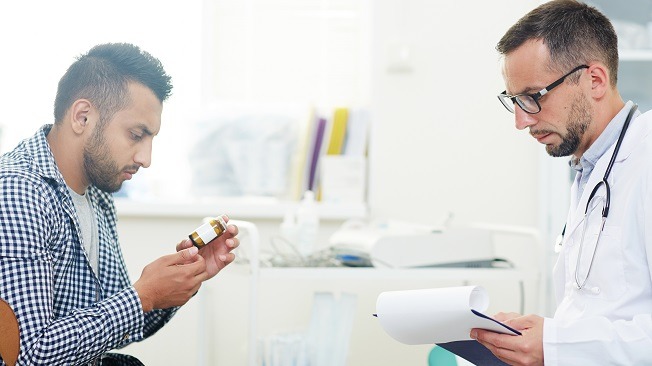A stressful condition for many men as they age is benign prostatic hyperplasia (BPH). Depending on the severity, waking up several times a night in the dark searching for the bathroom to go urinate, is enough to make even the most relaxed man stressed out. The frequent need to urinate, especially during the night, is the most common symptom of having an enlarged prostate or BPH, according to the American Urological Association (AUA). But other symptoms of BPH can also be anxiety-provoking such as embarrassing leaking, the urgent need to find a bathroom right away, or the feeling of not being able to completely empty the bladder.
What science says about stress and BPH
After awhile, lack of uninterrupted sleep, needing to find a bathroom right away, or unexpected leaking, can impact a guy’s job and social life raising stress levels. That’s why the Journal of Endourolgy discovered that as BHP symptoms increased, so did a man’s anxiety levels.
Since men who are symptomatic with BPH tend to have higher stress levels, is it possible stress alone can contribute to BPH, worsening the symptoms? It’s not a far-fetched idea. Many health conditions can be exacerbated by stress. Under very stressful situations, some individuals may notice certain bodily symptoms they normally don’t experience that may include heart palpitations, a rise in blood pressure, rashes, heartburn or even asthma attacks.
That’s why a 2005 study looked at the possible connection between stress and BPH of the prostate. Researchers wanted to know is there a connection between men under high amounts of stress worsening BPH symptoms than men under low amounts of stress. For the study, 83 men were enrolled, all with BPH, with an average age of 68. The study was designed to assess the effectiveness of two drugs commonly used to treat BPH – finasteride (Proscar) and doxazosin (Cardura). Each man completed a questionnaire to assess their total lifetime stress, recent stress, and hostility.
Since BPH is a gradual progression over time, lifelong stress did not seem to bring on growth of the prostate. But men experiencing recent high-level stressful events were the opposite. These men had more difficulty emptying their bladders than men who had not experienced recent stress. And men who carried hostility had increased effects from recent stress; men with both factors had the largest post-voiding residual urine volumes.
Managing stress to managing BPH
Since science has shown a connection between stress possibly making symptoms of BPH worse, the good news is there are ways to treat that situation. First, know that some degree of stress in our lives will never completely go away. Given that we are unable to predict when and how much stress may disrupt our day-to-day living, the best solution for men with BPH is to start with behavioral change techniques helping ease symptoms.
First, discuss with your doctor about their advice on prescription BPH medications. If symptoms are severe, this may be what is needed most. But, whether you take BPH medications or not, here are simple techniques to reduce the effect of stress on BPH:
- Exercise is a proven method for stress reduction. Go for walks, bicycle, swim, do any kind of movement to ease tension, improve sleep, and improve your mood.
- Reduce intake of fluids, especially at least 3 hours before bedtime
- Limit intake of alcohol and caffeine after mid-afternoon. Both are diuretics that increase urine flow.
- If taking a decongestant, be aware they may stimulate muscles in the bladder neck, and prostate increasing urine flow.
- Avoid letting your bladder get overly full. This can cause stretching of the bladder walls weakening them contributing to unawareness of the fullness of your bladder.
- Plan to take frequent bathroom breaks even if your bladder does not feel full.
- Always know where the bathroom is located when in places other than your home. This helps you find it easily and gives you more peace of mind avoiding embarrassing leaks.
- When at sporting events, the theater, or on an airplane, request the aisle seats to get up and out quickly and easily when needing to use the bathroom.
- In your home, have a nightlight on and remove any obstacles between your bed and bathroom to prevent stumbling during the night.
- Avoid sitting too long. Sitting too long in the same position can worsen BPH. Take plenty of short breaks to stretch your legs improving circulation flow.
- Practice Kegel exercises which help strengthen muscles around the bladder neck. Kegels can be done by contracting the muscles that are used to keep from urinating and squeeze tightly for 10 seconds. Then relax the muscles and repeat about 10 times. Doing these exercises three to five times a day may improve bladder control.


